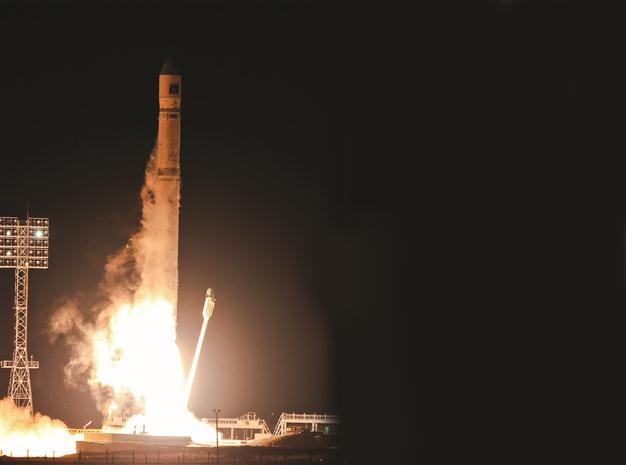Russians try to save failed Mars spaceship
MOSCOW - The Associated Press

The Zenit-2SB rocket, carrying the Phobos-Grunt probe, blasts off from its launch at the cosmodrome in Baikonur
yesterday. Roskosmos chief Vladimir Popovkin said an engine failed to fire on the
Phobos-Grunt probe after it reached Earth’s orbit. REUTERS Photo
Russian scientists were racing against the clock yesterday to find a way to fire the engines of an unmanned probe destined to collect soil samples from a moon of Mars, after equipment failure shortly after launch left it stuck in Earth orbit.
The Phobos-Grunt (Phobos-Soil) craft was successfully launched by a Zenit-2 booster rocket Moscow time yesterday from the Russian-leased Baikonur cosmodrome in Kazakhstan. It separated from the booster about 11 minutes later and was to fire its engines twice to set out on its path to the Red Planet, but it never did.
Russia’s Federal Space Agency chief Vladimir Popovkin said neither of the two engine burns worked, probably due to the failure of the craft’s orientation system. He said in televised remarks that space engineers have three days to reset the craft’s computer program to make it work before its batteries die.
James Oberg, a NASA veteran who now works as a space consultant, said that it’s still possible to regain control over the probe.
“With several days of battery power, and with the probe’s orbit slowly twisting out of the optimal alignment with the desired path towards Mars, the race is on to regain control, diagnose the potential computer code flaws, and send up emergency rocket engine control commands,” Oberg said in an email. “Depending on the actual root of the failure, this is not an impossible challenge.” He warned, however, that the effort to restore control over the probe is hampered by a limited earth-to-space communications network that forced Russian flight controllers to ask the general public in South America to help locate the craft. Amateur astronomers were the first to spot the trouble when they detected that the craft was stuck in Earth orbit.
The challenges for the Phobos-Grunt were daunting, making it arguably the most challenging unmanned interplanetary mission ever. It would require a long series of precision maneuvering for the probe to reach the potato-shaped moon, land on its surface, scrape it for samples and fly back.
Scientists hoped that studies of the Phobos soil could help solve the mystery of its origin and shed more light on the genesis of the solar system. Some believe that the crater-dented moon is an asteroid captured by Mars’ gravity, while others think it’s a piece of debris resulting from Mars’ collision with another celestial object.
The mishap is the latest in a series of recent launch failures that have raised concerns about the condition of Russia’s space industries. The Russian space agency said it will establish its own quality inspection teams at rocket factories to tighten oversight over production quality.
